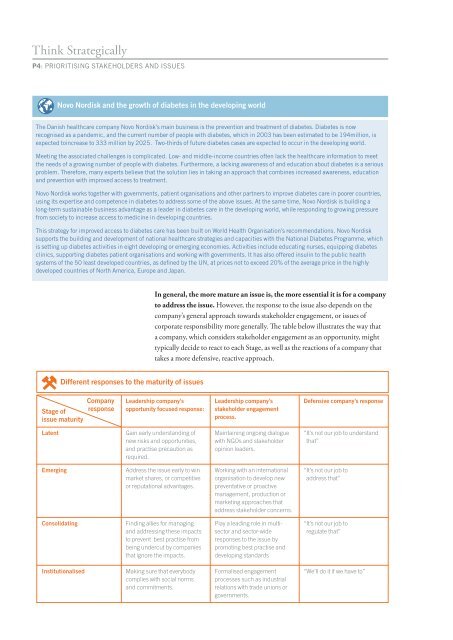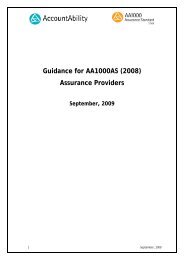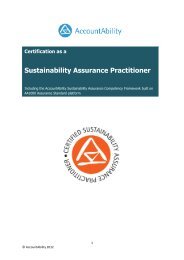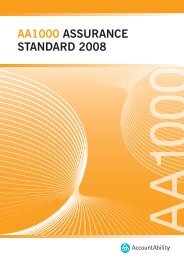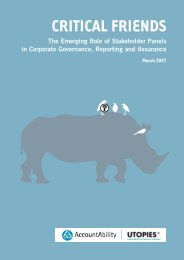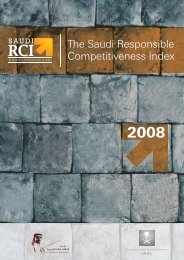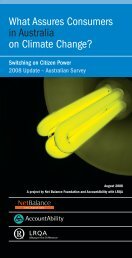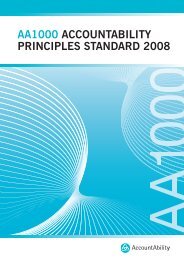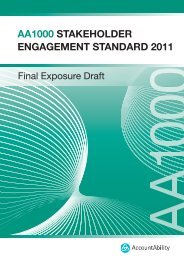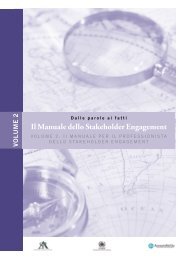The Stakeholder Engagement Manual Volume 2 - AccountAbility
The Stakeholder Engagement Manual Volume 2 - AccountAbility
The Stakeholder Engagement Manual Volume 2 - AccountAbility
You also want an ePaper? Increase the reach of your titles
YUMPU automatically turns print PDFs into web optimized ePapers that Google loves.
Think Strategically<br />
P4: PRIORITISING STAKEHOLDERS AND ISSUES<br />
Novo Nordisk and the growth of diabetes in the developing world<br />
<strong>The</strong> Danish healthcare company Novo Nordisk’s main business is the prevention and treatment of diabetes. Diabetes is now<br />
recognised as a pandemic, and the current number of people with diabetes, which in 2003 has been estimated to be 194million, is<br />
expected toincrease to 333 million by 2025. Two-thirds of future diabetes cases are expected to occur in the developing world.<br />
Meeting the associated challenges is complicated. Low- and middle-income countries often lack the healthcare information to meet<br />
the needs of a growing number of people with diabetes. Furthermore, a lacking awareness of and education about diabetes is a serious<br />
problem. <strong>The</strong>refore, many experts believe that the solution lies in taking an approach that combines increased awareness, education<br />
and prevention with improved access to treatment.<br />
Novo Nordisk works together with governments, patient organisations and other partners to improve diabetes care in poorer countries,<br />
using its expertise and competence in diabetes to address some of the above issues. At the same time, Novo Nordisk is building a<br />
long-term sustainable business advantage as a leader in diabetes care in the developing world, while responding to growing pressure<br />
from society to increase access to medicine in developing countries.<br />
This strategy for improved access to diabetes care has been built on World Health Organisation’s recommendations. Novo Nordisk<br />
supports the building and development of national healthcare strategies and capacities with the National Diabetes Programme, which<br />
is setting up diabetes activities in eight developing or emerging economies. Activities include educating nurses, equipping diabetes<br />
clinics, supporting diabetes patient organisations and working with governments. It has also offered insulin to the public health<br />
systems of the 50 least developed countries, as defi ned by the UN, at prices not to exceed 20% of the average price in the highly<br />
developed countries of North America, Europe and Japan.<br />
Stage of<br />
issue maturity<br />
Latent<br />
Emerging<br />
Consolidating<br />
Different responses to the maturity of issues<br />
Institutionalised<br />
Company<br />
response<br />
In general, the more mature an issue is, the more essential it is for a company<br />
to address the issue. However, the response to the issue also depends on the<br />
company’s general approach towards stakeholder engagement, or issues of<br />
corporate responsibility more generally. Th e table below illustrates the way that<br />
a company, which considers stakeholder engagement as an opportunity, might<br />
typically decide to react to each Stage, as well as the reactions of a company that<br />
takes a more defensive, reactive approach.<br />
Leadership company’s<br />
opportunity focused response:<br />
Gain early understanding of<br />
new risks and opportunities,<br />
and practise precaution as<br />
required.<br />
Address the issue early to win<br />
market shares, or competitive<br />
or reputational advantages.<br />
Finding allies for managing<br />
and addressing these impacts<br />
to prevent best practise from<br />
being undercut by companies<br />
that ignore the impacts.<br />
Making sure that everybody<br />
complies with social norms<br />
and commitments.<br />
Leadership company’s<br />
stakeholder engagement<br />
process.<br />
Maintaining ongoing dialogue<br />
with NGOs and stakeholder<br />
opinion leaders.<br />
Working with an international<br />
organisation to develop new<br />
preventative or proactive<br />
management, production or<br />
marketing approaches that<br />
address stakeholder concerns.<br />
Play a leading role in multisector<br />
and sector-wide<br />
responses to the issue by<br />
promoting best practise and<br />
developing standards<br />
Formalised engagement<br />
processes such as industrial<br />
relations with trade unions or<br />
governments.<br />
Defensive company’s response<br />
“ It’s not our job to understand<br />
that”<br />
“ It’s not our job to<br />
address that”<br />
“ It’s not our job to<br />
regulate that”<br />
“We’ll do it if we have to”


